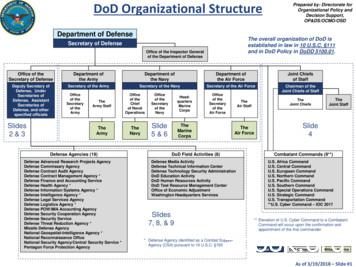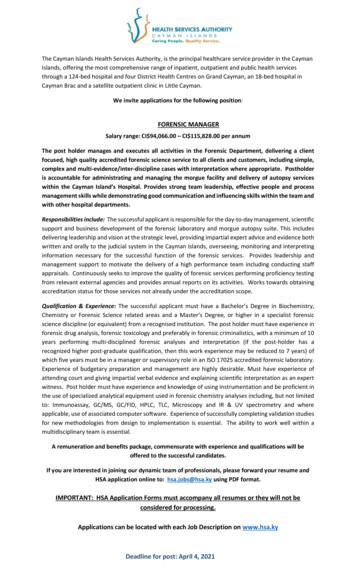DEPARTMENT OF DEFENSE FORENSIC CAPABILITIES
DEPARTMENT OF DEFENSEFORENSIC CAPABILITIESLarry C. ChelkoDirectorU.S. Army Criminal Investigation Laboratory(USACIL)
DOD’s FORENSIC CHALLENGEFuture: DOD/Fed Agency Integrationgin DOD/Intl Agency Integrationworg DOD/Natl Databasingrea Forensics/Biometricsnts geEmerging/Non-Traditional:Integrationem rginriue Intelligence Support to WMDreq e emcir Counter-Intelligence Technology Transferns es aerso Support to GWOT Long-Term Evidence Storage F ew uN Expeditionary Forensics Nation Building Foreign Language Forensic Accident InvestigationsDocuments Capability Accident ReconstructionTraditional: Site Exploitation Criminal Investigations Support to “significant”e. y.no Casualty Identificationsinvestigations-al boddn Medical Examiner Functions Education/Trainingta atings Network Intrusionsare rdin Contracting Forensicsso Forensic Expert Testimonyitie r colibpa ing o Repositoriesatcic egras Research & Developmenten intro Consulting ServicesD f is noO D here T
DOD’s FORENSIC SCIENCE COMMITTEE Established by DODIG (CIPO) Review and resolution of forensic science issues Primarily focused on criminal investigation Committee has no regulatory or policy authority
DOD’s FORENSIC CAPABILITIES(TRADITIONAL) The DOD possesses one of the most powerful forensics toolsets in the U.S. Nuclear DNA Drug Chemistry Digital Evidence Latent Prints Forensic Pathology Trace Evidence Forensic Documents Forensic Odontology Forensic Toxicology Others Firearms & Toolmarks Forensic Anthropology Mito-DNA Forensic Databases DOD’s enduring forensic capability exists in the institutional forensic laboratorieswithin DOD & forensic examiners comprise a high-demand/low-density skill set. DOD’s institutional forensic laboratories were designed, equipped, and manned toprovide a specific type of forensic support (traditional missions) to specificfunctional area (normally criminal investigative, judicial or medical). All of DOD’s institutional forensic laboratories are nationally accredited. Additionally, there are other agencies that can provide unique capabilities to theforensic effort, e.g., NAVEODTECHDIV, TEDAC, BFC, NGIC, research labs, etc.
DOD’s FORENSIC ORGANIZATIONSU.S. ArmyCriminal Investigation Laboratory(USACIL: Army)Larry C. ChelkoTel (404) 469469-7107Larry.chelko@us.army.milArmed ForcesInstitute of Pathology(AFIP: Army)LTC Louis N. FinelliTel (301) 319319-0124Finelli@afip.osd.milDepartment of DefenseCyber Crime Center(DC3: Air Force)Lt Col Jeff SalyardsTel (410) 981981-1181Jeff.salyards@dc3.milJoint POW/MIA Accounting CommandCentral Identification Laboratory(JPAC(JPAC-CIL: PACOM)Thomas D. Holland, Ph.D. DD-ABFATel (808) 448448-1725Thomas.Holland@jpac.pacom.mil
DOD Cyber Crime CenterMission: Digital evidence processing and electronic media analysis for criminallaw enforcement and DOD counterintelligence. Investigations and forensic training to DoD members to ensure infosystems are secure from unauthorized use. Research, development, testing and evaluation (RDT&E).Size: 20 Mil, 35 Gov, 138 ContractorsLocation: Lithicum, MDExecutive DirectorDoD CyberCrime CenterAffiliation: Air ForceDefense ComputerForensics LabDefense CyberInvestigationsTraining AcademyDefense CyberCrime Institute
Armed Forces Medical Examiner SystemMission: Conduct forensic investigations to determine the cause & manner of death Perform forensic toxicology services (including drug testing qualitycontrol programs, proficiency testing programs, and consultation servicesto the DoD for the Military Drug Testing program) Perform psychological autopsies in cases of equivocal manner of death Perform other forensic services, including epidemiologic analysis ofmilitary deaths; and Provide consultation and support to other governmental agencies on areimbursable basis.Size: Forensic Pathologists (13) Photographers (6) Investigators (4) Forensic Anthropologists (2)Location: Rockville, MD & Dover AFBAffiliation: Armed Force Institute of PathologyEA: Surgeon General
Armed Forces DNA Identification LaboratoryMission: Provides human remains identification; Provides forensic DNA analytical services; Provides bio-informatic analysis and management services; Provides mass fatality specimen collection and management services; Provides human reference specimen collection, cataloging, archival, andretrieval repository services. Supports AFMES & AFIP through consultation, education and research. Supports JPAC-CIL in the identification of human remains recoveredfrom personnel missing from previous American armed conflicts.Size: 1 Mil, 10 Gov, 127 ContractorsLocation: Rockville, MDAffiliation: AFME
Evidence Collection and DNASamplingUSSUSS Cole:Cole: OctOct 20002000EAEA 990:990: OctOct 19991999AKAAKA 261:261: JanJan 20002000UA 93: Sep 2001AA 77: Sep 2001Learjet:Learjet: OctOct 19991999USUS AirAir ExpressExpress 5481:5481: JanJan 20032003
Armed Forces Repository of Specimen Samplesfor the Identification of Remains(AFRSSIR) Repository of 5 million DNA samples,primarily from military service members Casualty identification
JFAIDDJointJoint FederalFederal AgenciesAgencies IntelligenceIntelligence DNADNA DatabaseDatabase Searchable database of DNA profiles from detainees andknown or suspected terrorists Partnership with defense, intelligence, and law enforcementprograms
Joint POW/MIA Accounting CommandCentral Identification LaboratoryMission:JPAC Achieve the fullest possible accounting of US service personnel missingfrom past conflicts Perform humanitarian missions as directedCIL Direct field recovery of human remains Conduct laboratory analyses of remains to support identifications Provide expert consultation to DOD and other government agencies inthe area of human recovery and identification Conduct scientific researchSize: 25 forensic anthropologists, 3 forensic odontologists, 8 Life SupportInvestigators, 10 photographers, and administrative staffLocation: HawaiiAffiliation: Pacific CommandJPAC-CIL is the largest forensic Anthropology laboratoryin the world
Provides forensicmtDNA analysis,family reference, andDNA data IT supportto the JPACMitochondrial DNA Section
U.S. Army Criminal Investigation LaboratoryMission: Provide worldwide forensic laboratory services, training, and R&D to allDOD investigative agencies, in: Trace Evidence DNA/Serology Latent Prints Firearms & Toolmarks Digital Evidence Drug Chemistry Forensic Documents DeFacto Executive Agent for Crime Lab Support to the Military CriminalInvestigation Organizations (MCIOs) DOD Executive Agent for the Military Convicted Offender Program / DNAProfile DatabasingSize: FY09: 157 Rqmts / 137 AuthLocation: Atlanta, GAAffiliation: ArmyUSACIL provides the widest range of servicesof all of the DOD accredited forensic laboratories
USACIL Services Evidence Examination Crime Scene Support Court Testimony Training Research And Development Field Investigative Equipment Acquisition Clearing House For Non-traditional Forensic Services Consultation Support To The Warfighter Database Development & Access
USACIL SUPPORT TO THEWARFIGHTERNo Gun RiTillman CaseAkbarAbu Ghraib
Military Criminal Investigative Organizations(MCIO) Forensic Consultant Programs Investigators with degrees in Forensic Science Provide advice and assistance to investigators Review of major cases and triage evidence prior tosubmission to labs Help optimize and standardize evidence collectionand submissions Help optimize and standardize utilization oflaboratory reports and services
DOD Forensics – The Positive Institutional labs have a broad, robust set of capabilities Institutional labs “relatively” well resourced Funding Staffing Training Equipment All institutional labs nationally accredited DOD personnel very active in professional forensicorganizations, national certification / accreditation bodies, andnational scientific working groups
DOD Forensics – The NegativeØ Not centrally managed, integrated or coordinatedØ Not resourced for emerging missionsCurrently developing the “Defense Forensic Enterprise System”
QUESTIONS?
Crime Center Defense Cyber Investigations Training Academy. Armed Forces Medical Examiner System Mission: . Investigators with degrees in Forensic Science Provide advice and assistance to investigators Review of major cases and triage evidence prior to submission to labs
Forensic Science is the integration of core scientific disciplines. Forensic science involves a variety of careers. 1. Students will recognize the major contributors to the development of Forensic . Worksheets Lab; Activity Project assessments Research activities such as “famous forensic scientists and their contributions” or “careers inFile Size: 444KBPage Count: 21People also search forforensic science for high school textbook pdfdo forensic criminologist investigate the cri forensic criminology bookswhat is a dental hygienisthow to check fingerprint forensic criminologyare dental hygienists and dentist same thing
Defense Advanced Research Projects Agency. Defense Commissary Agency. Defense Contract Audit Agency. Defense Contract Management Agency * Defense Finance and Accounting Service. Defense Health Agency * Defense Information Systems Agency * Defense Intelligence Agency * Defense Legal Services Agency. Defense Logistics Agency * Defense POW/MIA .
Forensic science is the application of science to law. Any science can be applied into a legal situation, but some of the commonest forensic sciences include forensic biology, forensic chemistry, and forensic toxicology. The word forensic in today’s world simply
forensic science discipline (or equivalent). Experience It is essential that the post holder is an experienced forensic scientist in forensic drug analysis, forensic toxicology and preferably in forensic criminalistics, with a minimum of 10 years performing multi-disciplined forensic
Forensic Psychology Chapter ObjeCtives ·orensic Define f psychology. · Review career areas in the forensic sciences. · Distinguish forensic psychology from forensic psychiatry. · Identify and describe the major subareas of forensic psychology. · Review the educational, training, and certification requirements to become a forensic psychologist.
Delivering forensic services (Report 21: 2018-19) 4 . Summary of audit findings . Delivering forensic services . We audited four types of forensic services: fingerprints, deoxyribonucleic acid(DNA), forensic medical examinations and illicit drugs. Three of these services accounted for approximately 92 per cent of all forensic services .
Department of Forensic Sciences FY2018 Agency Department of Forensic Sciences Agency Code FR0 Fiscal Year 2018 Mission The mission of the Department of Forensic Sciences (DFS) is to produce high quality, timely, accurate, and reliable forensic science with the use of the best available technology and practices, unbiased science, and transparency with the overall goal of enhancing public health .
Forensic Toxicology in Death Investigation Eugene C. Dinovo, Ph.D., and Robert H. Cravey Forensic toxicology is a highly specialized area of forensic science which requires exper tise in analytical chemistry, pharmacology, biochemistry, and forensic investigation. The practicing forensic toxicologist is concerned























